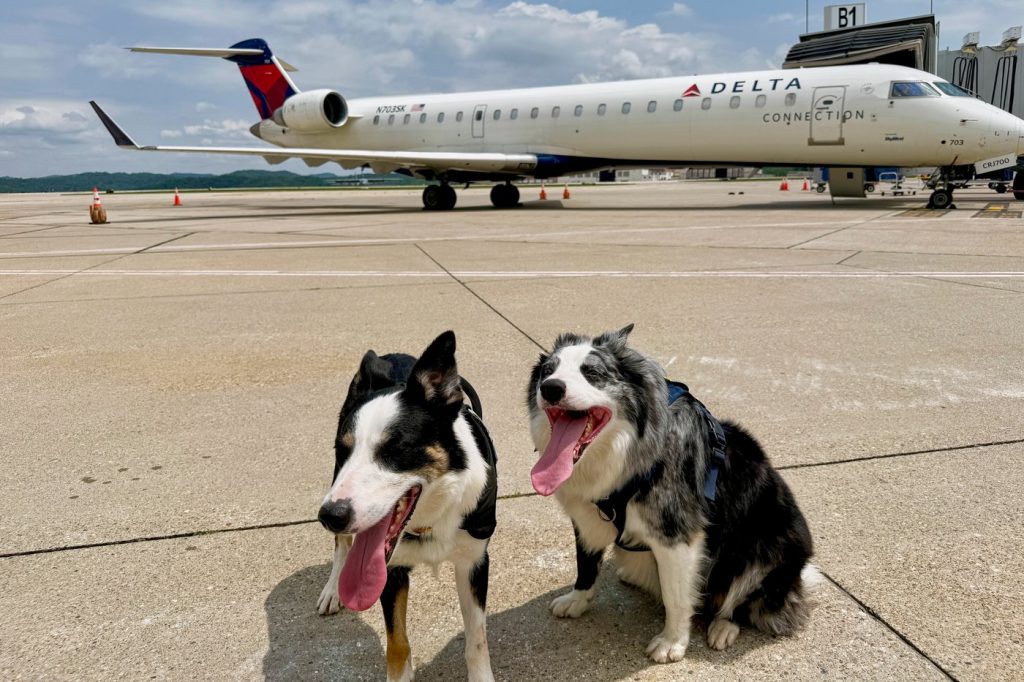CHARLESTON, W.Va. (AP) — Hercules and Ned, two border collies, have established their unique playground at West Virginia's busiest airport, the West Virginia International Yeager Airport. They engage in daily patrols along the mile-long airfield, preventing birds and other wildlife from endangering aircraft and enhancing the safety of passengers and crew. Hercules, the elder at eight years old, also serves as an airport ambassador, providing comfort to passengers, especially those anxious about flying.
In 2018, airport management acquired Hercules, following a recommendation from a wildlife biologist. Before coming to Charleston, Hercules underwent extensive training at Flyaway Geese in Charlotte, North Carolina, where he learned to herd geese and sheep. When he first arrived at the airport, Flyaway Geese owner Rebecca Gibson noted her excitement and relief at how well Hercules adapted to his new environment. His success in the role has made him a local celebrity, with a dedicated following on both Instagram and TikTok, as well as frequent interactions with school groups visiting the airport.
In the past year, Hercules gained a new companion, Ned, who, at the age of two, was trained to herd goats and geese prior to joining the team. Keyser, the dogs' handler and the airport's wildlife specialist, expressed confidence in Ned’s capabilities, noting that he has quickly learned to follow commands and understand safety protocols. While Hercules displays a calm demeanor when inside the terminal, Ned is full of energy, constantly seeking playtime with his blue bouncy ball when not on duty.
The airport, perched atop a mountain in Charleston, is a habitat for various wildlife, including Canada geese, hawks, ducks, songbirds, and bats. The presence of worms after rainfall increases bird activity, requiring vigilance from Keyser and his canine partners. The airport tower remains in constant communication with Keyser, who monitors wildlife on the field and reports sightings noted by incoming aircraft.
Bird strikes are a significant concern in aviation safety. In 2023, approximately 19,000 wildlife strikes involving planes were reported across U.S. airports, with 95% of those incidents involving birds, according to data from the Federal Aviation Administration (FAA). From 1988 to 2023, wildlife collisions led to the deaths of 76 people and the destruction of 126 aircraft. One notorious case is the 2009 incident involving U.S. Airways flight 1549, where a flock of Canada geese caused both engines to fail shortly after takeoff from New York's LaGuardia Airport, forcing pilot Chesley "Sully" Sullenberger to make an emergency landing in the Hudson River. Fortunately, all 155 passengers on board survived.
The frequency of wildlife interactions at Yeager Airport varies from year to year, ranging from just a few incidents to over twenty. Any collision requires an aircraft inspection, which often results in flight delays, complicating passenger travel plans. Keyser emphasized the critical nature of the dogs’ work in maintaining smooth airport operations. For instance, in 2022, five strikes were recorded involving bats, while there was an alarming incident in December 2000 where a plane hit two deer upon landing, resulting in serious passenger injuries.
Aside from their vital roles in wildlife management, Hercules and Ned contribute positively to the airport experience. When Hercules visits the terminal, he often brings joy to passengers, including Janet Spry, who was feeling anxious about her flight to visit family in San Antonio. After losing her beloved cat the previous day, Spry found comfort in Hercules's affectionate nature, highlighting the emotional support that therapy animals can provide in stressful situations.
In sum, the collaboration between the airport, wildlife specialists, and the border collies significantly enhances safety measures while also creating a warm and welcoming environment for passengers at Charleston's airport.










